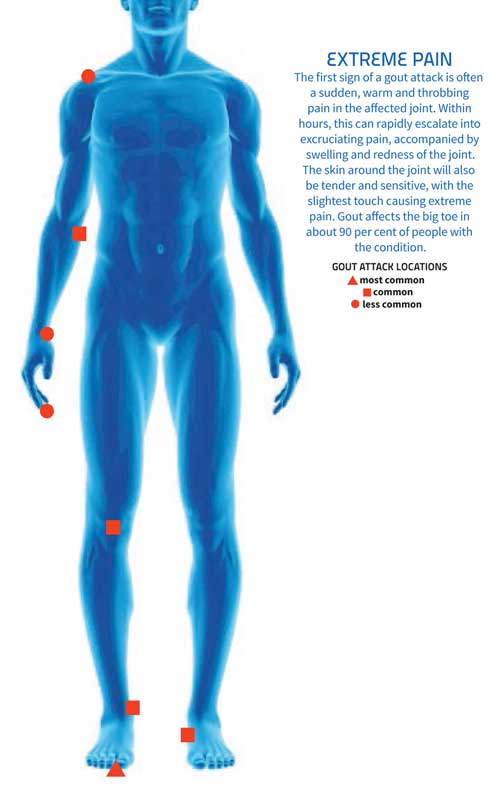WHEN Mr Zalfi Hasril first experienced an attack of gout, the pain in his ankle was so bad that he could hardly walk. He didn’t see a doctor but turned to a traditional Malay masseur because he thought the pain was due to a fall. The pain went away after about a week.
When he felt the same sort of excruciating pain a year later, Mr Zalfi decided to seek medical attention. After tests, he was found to be suffering from gout, a metabolic disorder that occurs when the kidneys are unable to get rid of excess uric acid. The acid ends up being deposited as crystals in the joint cartilage, tendons and surrounding tissues.
“Gout crystals deposited in the joints cause painful attacks, which is an inflammatory response,” said Dr Tan York Kiat, Consultant, Department of Rheumatology and Immunology, Singapore General Hospital (SGH).
Not everyone who has a high level of uric acid in the body will suffer from gout, but people with a persistently high level of the acid in their blood have a higher risk of getting the disorder, said Dr Tan.
Gout often runs in the family, although diet also plays an important role. It was once known as a “rich man’s disease” as it tended to affect the upper class who could afford rich foods. Now, gout can affect any part of the population, including younger people, as they become richer, eat more meat, and drink more. “A Western diet of red meat, liquor, alcohol and seafood tends to be associated with gout,” said Dr Tan.
Gout is also linked to obesity, hypertension and diabetes. Some drugs like diuretics can cause gout as a side-effect.
Gout attacks come and go, and the intervals between painful flare-ups can be as long as months or even years. But as the disease progresses, the flare-ups become more frequent and the intervals shorter, Dr Tan said.
In addition, some chronic sufferers develop tophi, clumps of uric acid crystals that form around joints, tendons, ligaments, and even in their earlobes.
Without treatment, years of gout attacks can damage the affected joints, leading to deformities, chronic pain, and immobility. A persistently high level of uric acid can cause kidney stones and affect kidney function.
Mr Zalfi, whose first attack occurred in 1997 and the second a year later, has been experiencing an attack almost monthly in the last two years. The father of two has modified his eating habits, and avoids nuts and meat. Because gout has caused him to walk with a painful limp, he no longer plays tennis and soccer or jogs. But to keep fit, he swims as often as possible.
“My advice to people with gout is to stay positive and exercise. Don’t forget your diet and medication. Most importantly, see your doctor regularly,” Mr Zalfi said.
Patients can never be cured of gout. It is a long-term disease that can be controlled by a combination of medication to control the uric acid level, and anti-inflammation drugs to treat a flare-up.
“Lowering the level of uric acid is key to treating gout, and patients must understand this. In the long term, if you do not use the uric acid-lowering medication, the gout will recur,” said Dr Tan.
“We know that putting a patient on uric acid-lowering therapy early helps. By lowering the uric acid in the blood to a certain level, the chance of getting a gout attack is drastically reduced.”
Some medicines reduce the formation of the uric acid in the blood while others increase uric acid excretion from the urine system.
“All aim to reduce the uric acid,” he added.
Avoid organ meats and keep diet balanced
The following is a low-purine diet that can help you limit the body’s uric acid production, according to Singapore General Hospital’s Department of Dietetics. Purine is a type of protein present in various types of food. When these proteins are broken down, uric acid is the end-product. Gout sufferers should follow a well-balanced diet while restricting their purine intake.
• Avoid foods rich in purine, such as liver, kidney, brain, heart and other organ meats; small fish such as anchovies, ikan bilis and sardines; mackerel; scallops and meat extracts
• Drink plenty of fluids daily
• Limit alcohol and fat intake
• Achieve and maintain a healthy body weight
• Consume asparagus, mushrooms and legumes in moderation
This story was first published in Singapore Health, Nov/Dec 2013.



